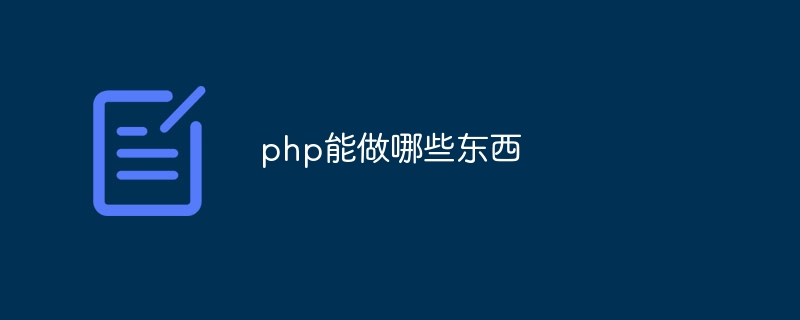Home >Backend Development >PHP Problem >What can php do?
What can php do?
- 小老鼠Original
- 2023-07-20 16:58:122683browse
php can do: 1. Build dynamic websites, such as e-commerce websites, social networks, forums, blogs, etc.; 2. Develop Web applications, whether they are enterprise applications for internal use or large-scale online services. ; 3. Development of e-commerce platforms, such as product display, shopping cart management, payment interface, order processing, etc.; 4. Development of content management systems to help website administrators simplify website maintenance tasks; 5. Development of Web services and APIs to create powerful The back-end functions support cross-platform data exchange and integration.

The operating environment of this tutorial: Windows 10 system, PHP8.1.3 version, Dell G3 computer.
PHP, as a powerful server-side scripting language, is widely used in the field of Web development. It has the following characteristics: easy to learn and use, open source and free, cross-platform, feature-rich and high performance. Because of these unique characteristics, PHP can do a lot of things. This article will explore the various application areas of PHP and the specific functions it can achieve.
First of all, one of the most common uses of PHP is to build dynamic websites. PHP can be perfectly combined with HTML and CSS to realize user registration, login, data query, data display and other functions through interaction with the database. PHP's powerful database processing capabilities and rich library functions allow developers to easily manipulate the database and perform data addition, deletion, modification and query operations according to user needs. By using PHP, developers can create many types of dynamic websites, such as e-commerce websites, social networks, forums, blogs, etc.
Secondly, PHP can also be used to develop web applications. Whether it is an enterprise application for internal use or a large-scale online service, PHP can handle these tasks. By using PHP frameworks such as Laravel and CodeIgniter, developers can build complex and efficient web applications more quickly. PHP's object-oriented programming (OOP) support and modular design make the code easier to maintain, extend, and reuse. At the same time, PHP's powerful file and directory processing functions also make it easier for developers to implement file upload, download, management and other functions.
In addition, PHP is also widely used in the development of e-commerce platforms. With the rapid development of the Internet, more and more companies choose to sell products and services online. PHP provides a wealth of library functions and plug-ins, allowing developers to easily implement the main functions required by the e-commerce platform, such as product display, shopping cart management, payment interface, order processing, etc. At the same time, PHP can also be integrated with third-party electronic payment systems to provide a more secure and convenient payment method.
In addition, PHP is also used to develop content management systems (CMS). A CMS is a software tool for managing and publishing content that helps webmasters simplify website maintenance tasks. PHP provides some popular CMS development frameworks, such as WordPress, Joomla and Drupal, allowing developers to build websites with powerful functions more quickly. Through CMS, administrators can easily add, edit and delete web page content to achieve dynamic updates and website customization.
Finally, PHP can also be used to develop web services and APIs. PHP can easily handle HTTP requests and responses and generate data formats such as JSON or XML for communication with other applications and services. By using PHP to develop web services and APIs, developers can create powerful back-end functionality that supports cross-platform data exchange and integration.
In summary, PHP can implement many functions and applications, including building dynamic websites, developing web applications, e-commerce platforms, content management systems, and creating web services and APIs. Its advantages of being easy to learn and use, powerful and high-performance make PHP the language of choice for many developers. In the future, as technology continues to advance, PHP will continue to develop and expand its application areas.
The above is the detailed content of What can php do?. For more information, please follow other related articles on the PHP Chinese website!

